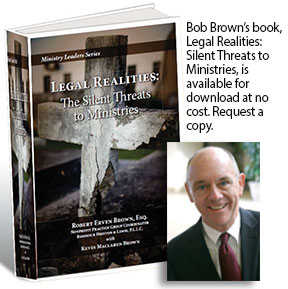
How does corporate church membership affect risk management? Just imagine: The head pastor of your church resigns unexpectedly, with no clear successor. The elders form a committee to select a new head pastor. This choice is rejected by some members. The members then file a lawsuit against your church in the local civil court.
When we think of risk management, we likely think of slip-and-fall lawsuits, or perhaps the church van. We rarely consider the threat of a lawsuit arising between members over the corporate bylaws. Yet, member lawsuits are just as likely as slip-and-falls.
Property disputes and clergy removal often rank high among the top 10 causes of church liability. Property disputes might occur when members vote to sell or purchase property. Clergy hiring or removal often correspond with a vote of the members. The common thread to disputes is membership voting.
Could this really happen?
This is exactly what happened in Houston, TX, at Christian Faith Missionary Baptist Church. A dispute among members came when the members vote was split on retaining a pastor. The losing members filed a lawsuit.
In response, the judge called a meeting of the church members to allow them to vote on committee members. When all “members” showed up, the judge decided she should instead have a formal hearing and issued an order requiring the parties to be in court in the next week.
Does this dispute really belong in a civil courtroom?
On December 12, 2012, a Louisiana court ruled that a trial court has jurisdiction —i.e., the legal power to analyze a church’s articles of incorporation and to determine the criteria for church membership. (Warner v. Collins, — So.3d —-, 2012 WL 6218173 (La.App. 4 Cir. 2012))
The judge was allowed to determine church membership based on the corporate code. Other state courts have made similar rulings. In a Florida lawsuit, a group of elders sued the church. The court found that the bylaws failed to address removal of board members. As a result, the Florida court interpreted Florida’s corporate law to determine the elders’ rights. The Florida court ruled:
“When a church-related dispute can be resolved by applying neutral principles of law without inquiry into religious doctrine and without resolving religious controversy, the civil courts may adjudicate the dispute ….” (Bendross v. Readon, 89 So.3d 258 (2012))
A court might review a church’s corporate structure, members’ rights and other corporate legal issues. The judge might decide who is a member under the corporate law, or the judge might determine that a member should have access to all books and records, including member contributions and financials.
So, what should a church do?
The simple answer is to amend your church articles of incorporation and bylaws to place the dispute beyond the jurisdiction of the civil courts. A court’s jurisdiction can be eliminated through a concept called church autonomy doctrine. This doctrine prohibits civil court review of internal church disputes involving matters of faith, doctrine, church governance and polity. (Kedroff v. St. Nicholas Cathedral, 344 U.S. 94, 116-17, 73 S.Ct. 143, 97 L.Ed. 120 (1952)) In other words, if a court has to read Scripture or interpret a statement of faith, the court will automatically throw out the lawsuit.
Keeping your church out of court is not only good for your health, it’s Scriptural. And the best method for implementing the church autonomy doctrine is to rewrite the church bylaws to eliminate “statutory members.” Instead of relying on the legal definition of corporate membership, the church’s bylaws should define members as “Scriptural” or “Spiritual Members.” Legal assistance is highly recommended in performing this drafting!
Often, churches object to the proposal of removing corporate membership. The reality is that church membership existed long before corporate structures. Maintaining Scriptural Members allows the elders or pastors to establish membership criteria that cannot be questioned.
Membership is just one of several issues to consider when reviewing your church’s bylaws from a risk management perspective. Other issues include the definition of marriage, determination of membership and eldership, use of real property, pastor accountability, board member fiduciary liability, complex meeting provisions, and others.
Below is a table that compares corporate membership and Scriptural membership. The side-by-side comparison reveals the benefits to Scriptural Membership.
The bottom line: Personally confirm what rights your church’s bylaws give to it “members.” If you want to avoid a secular court and judge, update those bylaws so that membership is defined by Scriptures and not by your state’s corporate code as interpreted by a judge/jury, which doesn’t share your faith!


Robert Erven Brown is an attorney licensed to practice in Arizona. He and his nonprofit practice group work with nonprofits and churches helping them manage key operations connected with their missions, visions and causes. As permitted by local Rules of Ethics, they collaborate with attorneys who are licensed in states other than Arizona. Bob is author of Legal Realities: Silent Threats to Ministries, which describes his Campus Preservation Planning© initiative — a comprehensive program designed to manage the wide array of risks facing non-profit organizations. He can be reached by email or by calling 602.744.5748. RHL is located at 201 North Central Ave., Suite 3300, Phoenix, AZ 85004.
This publication is offered as a public service by the Nonprofit Practice Group at Ridenour, Hienton & Lewis (RHL) for general educational purposes to provide accurate and authoritative information on general principles of law. It is not intended to provide, and may not be relied on as, legal advice. The publisher is not engaged in rendering legal, accounting or other professional service. If legal advice or other expert assistance is required, then services of a competent professional person should be sought. “From a Declaration of Principles jointly adopted by a Committee of the American Bar Association and a Committee of Publishers and Associations.” This article may not be used as a substitute for competent legal advice from a licensed professional attorney in your local jurisdiction. No “informal” legal advice will be provided by telephone. Simply sending an e-mail to Mr. Brown will not create an attorney-client relationship. A formal attorney client relationship will not be established until a conflict check is completed and an engagement letter has been signed by both the attorney and the client.


